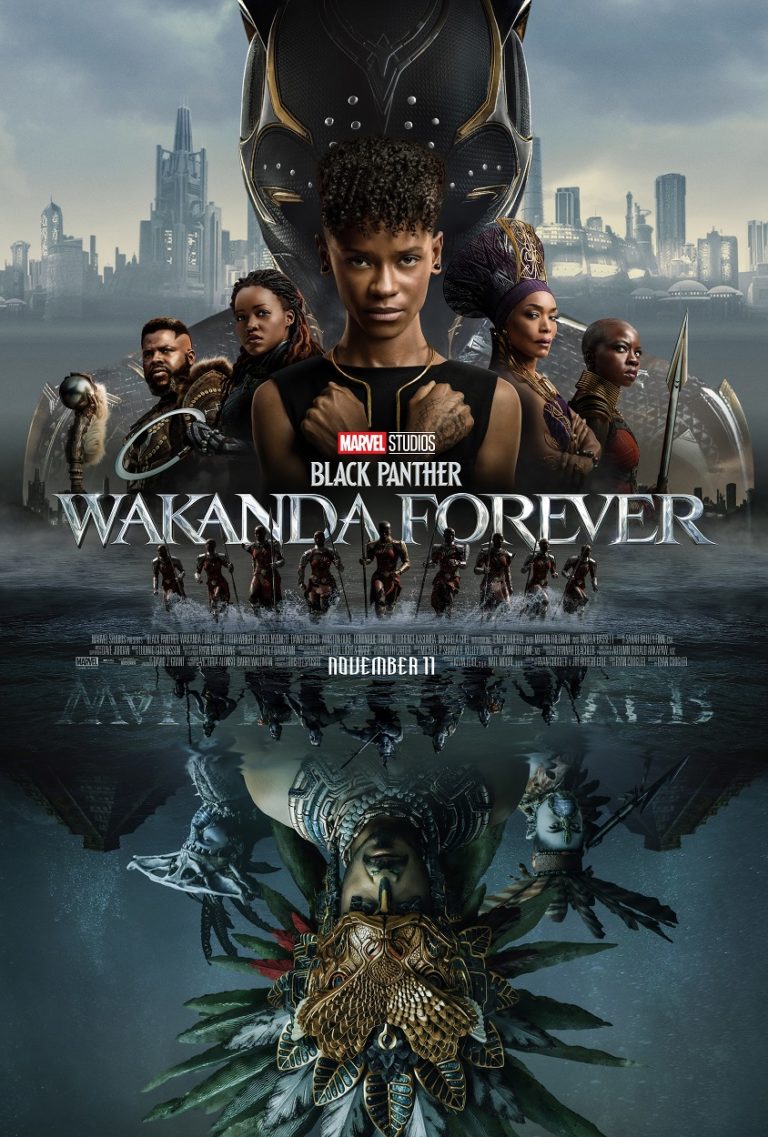
While the first Black Panther was an overwhelming success, the MCU didn’t need a film to turn the tide of its fortunes then. The series up to that point and directly after was the cream of the crop for the comic/action film fans. In recent times though, while still the jewel of the crown, the MCU has been hit with mixed reaction outing after mixed reaction outing. Now returning without its big star Chadwick Boseman, who lost his battle with cancer, can Black Panther: Wakanda Forever bring the MCU back to its full glory?
The King is dead. After Princess Shuri (Letitia Wright) could not recreate the special flower that gives the Black Panther their powers after the entire crop was burned by Killmonger, there was no hope in saving her brother’s life. Taking back her reign as Queen, their mother Ramonda (Angel Bassett) has to deal with the loss of her son, the unwillingness of her daughter to move past it, and the pressure of looking after her people.
A year has passed since T’Challa’s death, and the world governments are sparing no expense to find vibranium outside of Wakanda. When their searches disturb the underwater kingdom of Talokan, the people of Wakanda are put in the middle of an upcoming battle between Talokan’s leader, Namor (Tenoch Huerta), and the rest of the world.

Black Panther: Wakanda Forever is tasked with doing something no other Marvel film has seen. It needs to be a bigger hit than its mainline predecessor, and it needs to do so without the beloved star that so many fans had come to love. The Black Panther cinematic universe is chock full of wonderful talent, but the fans wanted to see Chadwick, again. The final picture does all it can to pay tribute to its fallen leader, but that entails dragging out a 2 hour and 40 minute runtime with sappy, depressing family issues that feel like a drag.
Action films shouldn’t shy away from dramatic responsibilities. No one should be faulted for taking that road. But Black Panther: Wakanda Forever is another slog of a film that does very little to push the envelope. Reflective inner demons and mental battles are surrounded by dunes of small details that are forgotten about or contradicted every other scene. When it comes to the action, common sense and story are thrown to the side to make way for uninteresting fights and mushy visuals. One minute, soldiers of Talokan are made to look invincible (literally can walk away from life threatening wounds), and the next they are made out to be more mortal than humans.
A not entirely major plot point delivered at the close of the film is hinted in passing early on as Shuri and Ramonda first meet Namor. But in the more than 2 hour gap between the set-up and delivery–not a single possible clue, mention, or discussion about what the situation could even possibly surround is brought up. It’s only when the show drops does one realize the earlier attempt to create some sort of mystery is wholly unnecessary. It’s a magic trick with no trick; “Hey, I have a deck of cards here.” 2 hours pass without talking about cards or magic, “Oh, look, here is a card from the deck I had.”

The cast does a great job of bringing these characters back to life with both old and new nightmares haunting them at every corner. Angela Bassett gives what could be considered the best true acting performance in any Marvel film. Letita Wright does everything she can to control the new narrative of the post-Chadwick world; but there is something strange about the character (something out of her control) that leaves a strange after taste as the credits roll. Tenoch Huerta also does a great job of bringing a more nuanced antagonist to life, even if the logistics of his silly looking winged feet are confusing to think about.
For all its problems, Black Panther: Wakanda Forever is not a bad film. The balance between reflective drama and fun loving action film is just too off center. The right moves were made, but the end result doesn’t completely work. What’s worse is the strange ambiguity of much of the film’s ending leaves one yearning with more questions than their needs to be. A film does not need to be finite on every character’s future, but leaving the fate of some of your most important characters this wide open is a strange move.
Final Grade: C+

